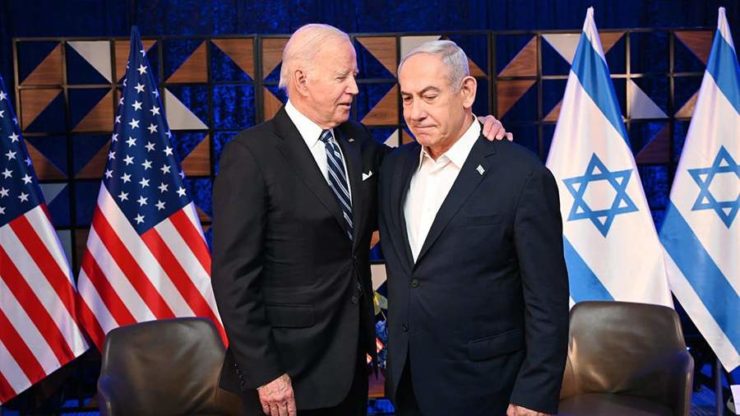
The United States has always been a supporter of Israel in the Middle East since the latter’s creation. The United States has always seen Israel as its asset in the Middle Eastern region. Israel’s 70 percent of weapon supplies come from the United States. Moreover, Israel is the largest cumulative recipient of US aid, with almost $300 billion in economic and military aid, since the end of World War 2.
The United States also provides economic assistance to other Middle Eastern countries like Iraq, Jordan, and Egypt – but this aid is far less than what it provides to Israel. Recently, the United States has agreed to provide $4 billion per annum to Israel. The United States has provided multiple peculiar exemptions to Israel.
Almost $3.3 billion in aid is provided to Israel by the United States under the Foreign Military Fund (FMF) program. The FMF funds are granted to the US allies just to purchase US military services and equipment. However, Israel is the sole country in the world that is allowed to use a portion of this amount to purchase military equipment from its own defense firms. Reportedly, the US aid accounts for around 15 percent of the Israel defense budget. In addition, around $500 million per year is allocated for the joint defense ventures between the United States and Israel.
Controversies and Criticisms: Israel’s Impact on US Interests
The United States is one of the very few countries in the world that are supporting the Israeli genocidal operations in Gaza. It vetoed multiple UN resolutions seeking humanitarian peace in Gaza. Moreover, it has also provided military and economic aid to commit massacres against the innocent civilians of Gaza. The United States is even suppressing the internal dissent forcefully to stand with Israel’s war crimes. The United States, the self-proclaimed flag-bearer of liberal values and human rights, is vehemently quashing the student uprisings against Israel’s genocide in Gaza in the US universities. More than 2000 students have been arrested by the US police for protesting in favor of a humanitarian ceasefire in Gaza and against the US support for Israeli war crimes. Israel’s war crimes in Gaza are proving detrimental to the US hegemony and influence over the world. Furthermore, the public backlash in the US state primaries against President Biden has not been able to alter the country’s outlook towards the Israel-Hamas war.
The sole reason behind all this is the prevalent narrative in the US establishment and deep state that Israel’s support is imperative for the United States to influence the Middle East and to curtail the increasing presence of Russia, China, and Iran in the region. Over the decades, Israel has been successful in dividing the Middle Eastern region and plunging it into chaos and turmoil through proxy wars. However, some Western philosophers and observers are raising serious concerns about the US policy towards Israel due to the latter’s policies and actions. Jon Hoffman, a senior foreign policy analyst, recently stated in one of his articles that Israel is a liability for the United States in the Middle Eastern region. He mentioned in his article that the US has been providing military support and diplomatic cover to Israel since the latter’s inception. Both the mainstream American political parties, diplomats and Republicans, have always been following identical policies toward Israel. The incumbent US President Joe Biden has repeatedly declared himself a Zionist. Moreover, President Biden, describing the significance of Israel for the US, had also stated that the United States would have to create Israel if it was not already created.
The Debate: Asset or Liability?
Jon Hoffman held in his article that this relationship is totally one-sided, as it only banks on US aid to Israel. He mentioned that the US pays $3.8 billion to Israel for its military and defense aid. Moreover, the US also pays a handsome amount to Jordan and Egypt to protect Israel from any significant threat from an anti-Israel government in these neighboring countries. Israel also gains access to all military technology and weapons on a priority basis from the US, to maintain the former’s military supremacy in the region, under the Qualitative Military Edge policy, which the latter needs to provide its Middle Eastern allies. The US is also barred from providing any military technology to the Middle Eastern states which could impinge Israel’s qualitative military edge in the region. However, the question is what the US gets in return. Some analysts hold that Israel provides intelligence to the US and protects its regional interests. Nevertheless, many political scientists and observers disagree with this notion. Since October 7, Israel has proven to be detrimental to the US interests in the Middle East. The latter seeks a two-state solution to the Palestine issue, but Israel does not agree. Moreover, Israel’s continuous rivalry with the Arab states and different regional non-state actors poses a significant threat to the US interests and the security of its officials in the region. In addition, Israel is the main cause behind the US-Iran rivalry. Otherwise, the US could resolve its disputes with Iran diplomatically. Furthermore, the Houthi attacks on Western ships in the Red Sea are also due to Israel’s incumbent war crimes against the Palestinian people. This makes Israel a liability for the US instead of an asset as fallaciously perceived by the deep state in the US.
Abbas Hashemite – is a political observer and research analyst for regional and global geopolitical issues. He is currently working as an independent researcher and journalist, exclusively for “New Eastern Outlook”.